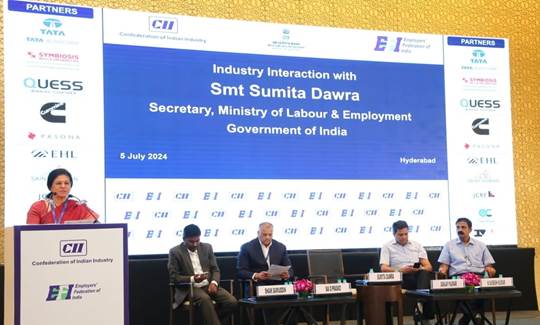Ministry of Labour & Employment
Industry Interaction with Smt. Sumita Dawra, Secretary, Ministry of Labour & Employment, Government of India
“Demographic dividend and labour reforms will drive future growth”: Smt Dawra
8 crore new employment opportunities created in India during past five years (till 2021-22)
More than 1 crore vacancies mobilised on NCS portal during 2023-24
CII and EFI welcomed the measures being taken by Government of India for facilitating the industry in quality employment generation and promoting labour welfare
Posted On:
06 JUL 2024 4:04PM by PIB Delhi
Smt. Sumita Dawra, Secretary, Ministry of Labour & Employment, Government of India participated in an industry interaction organised by Confederation of Indian Industry (CII) and the Employers’ Federation of India (EFI) on 5th July 2024 at Hyderabad.
In her inaugural address, Smt. Sumita Dawra, Secretary, Ministry of Labour and Employment, highlighted India’s fast growth rates, and emphasized that India's demographic dividend and labour reforms are pivotal to driving future growth, alongside other growth engines of manufacturing, expansion of service sector, infrastructure, etc.

Citing the RBI’s KLEMS data, she conveyed that about 8 crore new employment opportunities were created in India during past five years [ending 2021-22], largely driven by various government initiatives aimed at incentivising and promoting manufacturing ( such as PLI, Make in India), expansion of services sector, access to micro credit, investments, emergence of new areas such as Gig and Platform workers, Global Capability Centres (GCCs) and Startups, etc. She further highlighted the growing gig economy, which is estimated to employ about 2.3 crore people by 2030.
Smt. Dawra discussed the consolidation of 29 labour laws into four comprehensive codes aimed at simplifying regulations and administrative processes, including the decriminalization of labour laws, thereby enhancing ease of doing business and reduction in compliance burden. This will in turn be attractive for enhanced domestic and foreign investment flows, and in bringing supply chains and global value chains to India, she added. She further said that the reforms will stimulate the economy, enhancing employment opportunities, increasing female workforce participation, and improvements in social security and labour welfare, all of which are expected to drive inclusive growth in India. Currently, India's GDP is more than USD 3 trillion and is expected to reach USD 33 trillion by 2047 riding on various initiatives, including labour reforms, she added.
Smt Dawra underscored the importance of expanding social security coverage for the unorganized and informal sectors while recognizing the need for governance reforms in the Employees' State Insurance Corporation (ESIC) and the Employees' Provident Fund Organisation (EPFO). She also highlighted various systemic reforms initiated in ESIC and EPFO such as auto settlement of claims, reduction in rejections, and improving the pace of claims settlement in EPFO, as well as enhancing the coverage and quality of services in ESIC.
During the interaction, presentations on various systemic reforms in ESIC and EPFO were made, outlining topics such as digitization, e-governance, and compliance simplification, with discussions aimed at gathering suggestions from participants to further improve these systems.
The National Career Service (NCS) portal of Ministry of Labour and Employment was also showcased as a comprehensive solution for career counselling and employment networking. It was highlighted that more than 1 crore vacancies were mobilised on NCS portal during 2023-24. The portal is also integrating SIDH database from the Ministry of Skill Development and Entrepreneurship to ensure availability of rich pool of skilled jobseekers on the portal to reduce skill gap in labour market. The ongoing integration of databases of the two Ministries will effectively link the youth to both skills and employment, resulting in aligning the demand-supply gap in the labour market, it was informed.
The session highlighted the collaborative efforts between the government and industry to create a positive environment for economic development and employment growth. Such interactions are crucial for creating awareness and implementing effective reforms, besides getting feedback from industry and other stakeholders.
The session witnessed participation from over 300 industry representatives keen to engage in discussions on critical labour and employment reforms shaping India’s economic landscape. Senior officials from the Ministry of Labour and Employment, EPFO, ESIC and State Government of Telangana also attended the session.
The event aimed to foster dialogue between government officials and industry stakeholders, focusing on employment generation, labour reforms, and ease of doing business in India.
****
Pragya Paliwal Gaur/ Himanshu Pathak
(Release ID: 2031223)
Visitor Counter : 2454